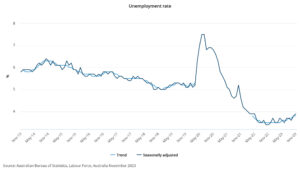AI, AI, AI! It seems like Artificial intelligence (AI) is everywhere across the media and conversations about the future of work. And while you may have had a go at using generative AI tools like ChatGPT to write a position description or a job ad, in the NFP sector AI is nowhere close to transforming the way we work.
So if 2024 isn’t the year that “AI will change everything“, what will this year hold when it comes to people, culture and work in Australia’s NFP sector?
Here’s a look at the top 5 trends the EthicalJobs.com.au team sees shaping recruitment, HR and P&C leaders and teams at Australian not-for-profit organisations over 2024:
1) The cost of living crisis will mean applicants are more focused on wages than before
While consumer price inflation has been slowing recently, prices for basics like food, rent and energy have been on a tear over the last two years, and “cost of living crisis” has become one of the most common buzz phrases in the media.
But with more Australians than ever struggling to afford the basics of life, in 2024 more people than ever will prioritise finding a job with higher wages, or will negotiate for higher pay when that’s possible. [Read our post on how to talk about money in job interviews here.]
Will higher wages become more important to jobseekers than job flexibility? Probably not, since flexibility has been at the top of their priorities for years, and seems to be continuing as a top priority for most.
2) A slowly increasing unemployment rate will mean more applications per job
Back in the dark days of the pandemic when Australia’s borders were closed, the labour market reached the tightest point in Australian history, with near-record low unemployment, and huge competition from all sectors for staff to fill too many vacancies.
With migration into Australia now at it’s highest ever level, the unemployment rate has slowly started to rise from its pandemic lows:

According to the mid-year economic and fiscal outlook report released in December, the Commonwealth treasury expects the unemployment rate to be about 4.25% by June this year. By June 2025 it should rise to 4.5% – still low but significantly higher than today.
This will be good news for NFP employers, because it will result in more applications per job advertised, though whether things will return to the high numbers of applicants job ads received pre-pandemic is uncertain.
3) Interview scheduling software will go mainstream and save many hours of back-and-forth emails
Are you still booking your interviews by “hand”, spending minutes, up to hours in frustrating back-and-forth emails with multiple candidates for each job you advertise?
An impressive crop of new tools are making that a thing of the past, and in 2024 we reckon these tools will go mainstream in Australia’s NFP sector.
So if you’re spending your days trying to schedule candidate interviews and you haven’t yet switched to a meeting scheduling tool, get on board this trend and take a look at some of the options:
4) More organisations will trial a 4-day work week for some or all staff
The four day week has been a sleeper issue for many years – in fact, going back almost 100 years, in 1930, economist John Mayard Keynes advocated for a reduced work week, and his idea has had a revival in many countries since the COVID-19 pandemic.
2023 was a big year for the 4-day work week.
In March, 3000 employees across more than 60 employers in the UK took part in the world’s largest trial of the four-day work week. Some impacts of the trial included; rates of burnout falling by 71%, stress levels declining by 39% and people’s overall satisfaction with their time increasing by 75%. And a majority of managers and staff who took part, liked it so much they’ve decided to keep the arrangement.
Also in 2023, the Senate’s Select Committee on Work and Care issued a unanimous report that called on the Federal Government to:
undertake a four‑day week trial based on the 100:80:100 model whereby employees retain 100 per cent of the salary while reducing their hours to 80 per cent while maintaining 100 per cent productivity. The trial should be implemented in diverse sectors and geographical locations.
Finally, 2023 saw two significant Australian NFPs switch to a four-day work week.
The Australian Services Union (ASU) became the first trade union to include a four-day work week in an enterprise bargaining agreement, and Oxfam Australia also allowed all its full-time employees – more than 100 in all – to work a 4-day week for the same pay.
Oxfam CEO Lyn Morgain told the ABC that
“We anticipate that we’ll see all the gains that other organisations have seen, but we want to make sure that whatever we settle on works for the colleagues that are doing the work.”
2024 will surely see the push for a 4-day work week get even stronger, and we’re sure that we’ll see more NFP organisations following in Oxfam’s footsteps and trialing a four-day work week for their staff.
5) More organisations will invest in employee referral programs
In 2023 just 37% of NFPs surveyed told us they had an employee referral program (ERP) to encourage their existing staff to refer people in their network to apply for job vacancies in the organisation.
At the same time, more NFPs than ever are struggling to recruit all the staff and volunteers they need, and we reckon 2024 will see more organisations will adopt employee referral programs to help bridge that gap.
Referral programs are cheap and easy to establish, and data shows that referred employees stay longer than average, and time-to-hire was faster than average for referred employees too.
6) NFP organisations will improve their job ads, employer branding and candidate experience
One outcome from over two years of record-low unemployment in Australia is that many NFP organisations have gotten better at pitching themselves to jobseekers who have been fewer and more picky.
Job ads have improved, employer branding has improved, and many organisations have worked hard to improve candidate experience, including better and more individualised communication with applicants, aided by Applicant Management Systems.
In 2024 we’re predicting these trends will continue, with NFP organisations continuing to step up to the challenge of making themselves more appealing to jobseekers.
The result will see more time and effort in 2024 being put into improving career pages, recruitment videos and Employee Value Propositions (EVPs) for NFP organisations right across the sector.
—
That’s it! If there’s anything we missed, let us know your thoughts below on what 2024 will hold for HR / People & Culture professionals and teams in the NFP sector!
Related Posts



